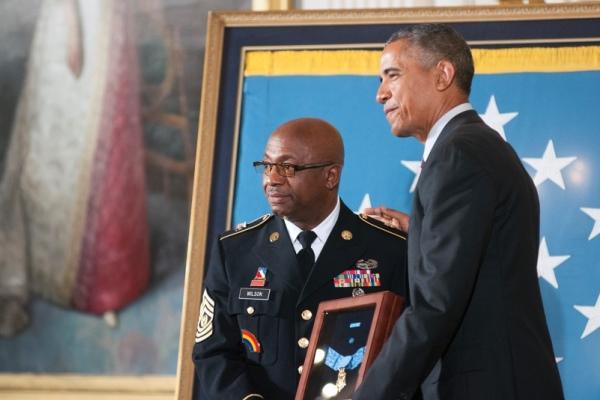"It's never too late to say thank you," President Obama said Tuesday in a White House ceremony for the posthumous award of Medals of Honor to two "doughboys" of the Great War.
Ninety-seven years after they fought in the World War I "No Man's Land" of France, Pvt. Henry Johnson and Sgt. William Shemin were accorded the nation's highest award for valor.
Speaking in the East Room of the White House, Obama said that the nation's sad legacy of discrimination was a factor in denying the honor for so long to both Johnson and Shemin.
Johnson, who fought the Germans with a rifle butt and his "Bolo" knife, served with the all-black 369th Regiment, known as the "Harlem Hellfighters." Because blacks were not deemed fit to serve in combat by the U.S., Gen. John J. Pershing, commander of the American Expeditionary Forces, detached the 369th to serve with the French army on the front lines, Obama said.
Related Story: With Medal of Honor Award, Family Learns WWI Hero Wasn't Kin
Shemin, who lied about his age to join the Army, was a Jewish-American from Bayonne, N.J., whose Russian immigrant parents had survived the anti-Semitic pogroms in Europe to come to America. Shemin braved machine gun fire repeatedly to race into "No Man's Land" to rescue wounded comrades while serving with the 47th Infantry Regiment, 4th Division.
In saying "thanks" to Shemin and Johnson, Obama noted that "it takes our nation too long, sometimes, to say so. We have work to do as a nation to make sure that all of our heroes' stories are told."
"The least we can do is to say, 'We know who you are, we know what you did for us. We are forever grateful,'" Obama said.
Command Sgt. Maj. Louis Wilson of the New York National Guard accepted the award on behalf of Johnson, who entered the Army as a member of an all-black National Guard unit in 1917.
Shemin's daughters, Ina Bass, 83, and Elsie Shemin-Roth, 86, accepted the award on behalf of their father.
Johnson's medal citation said that on the Western Front on May 15, 1918, he and another soldier, Pvt. Needham Roberts, were on sentry duty in the trenches when a German raiding party attacked. Johnson and Roberts fought back until they ran out of ammunition.
"When his fellow soldier was badly wounded and being carried away by the enemy, Private Johnson exposed himself to great danger by advancing from his position to engage the two enemy captors in hand-to-hand combat. Wielding only a knife and gravely wounded himself, Private Johnson continued fighting, defeating the two captors and rescuing the wounded soldier," the citation said.
Shemin's citation noted his "extraordinary acts of heroism" while serving with "G Company, 2nd Battalion, 47th Infantry Regiment, 4th Division along the Vesle River, near Bazoches, France, from August 7th-9th, 1918.
"Sgt. Shemin upon three different occasions left cover and crossed an open space of 150 yards, repeatedly exposing himself to heavy machine gun and rifle fire to rescue wounded," the citation said.
"After officers and senior non-commissioned officers had become casualties, Sgt. Shemin took command of the platoon and displayed great initiative under fire until wounded on August 9th."
Obama said Shemin's daughter, Elsie, told him that she had a theory about why her father served in World War I and tried to enlist again for World War II but was turned down by the Army.
"His family lived through the pogroms," she said. "They saw towns destroyed and children killed. And then they came to America. And here they found a haven -- a home -- success -- and my father and his sister both went to college."
"All that, in one generation. That's what America meant to him. And that's why he'd do anything for this country."
Johnson's life after the war took another path. "His injuries left him crippled. He couldn't find work. His marriage fell apart. And in his early 30s, he passed away," Obama said.
"Now, America can't change what happened to Henry Johnson. We can't change what happened to too many soldiers like him, who went uncelebrated because our nation judged them by the color of their skin and not the content of their character.
"But we can do our best to make it right. And today, 97 years after his extraordinary acts of courage and selflessness, I'm proud to award him the Medal of Honor."
-- Richard Sisk can be reached at Richard.Sisk@military.com




























